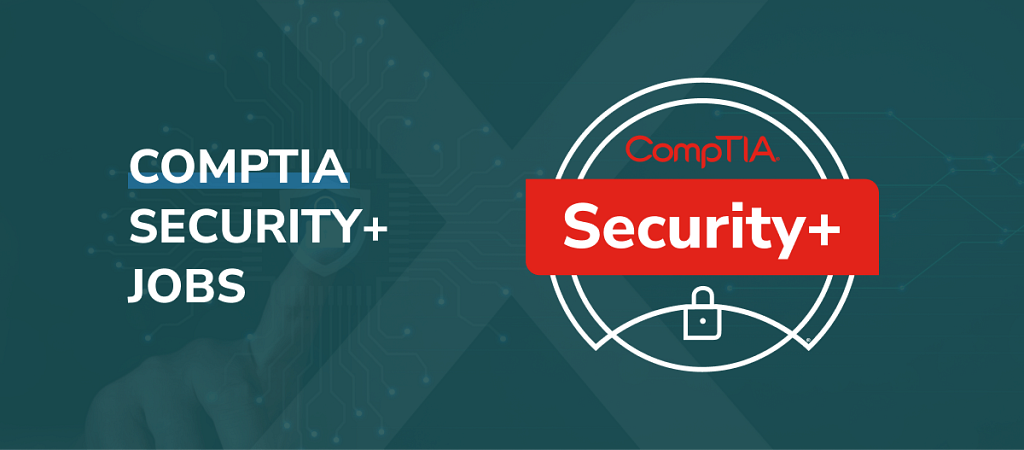September 5, 2023
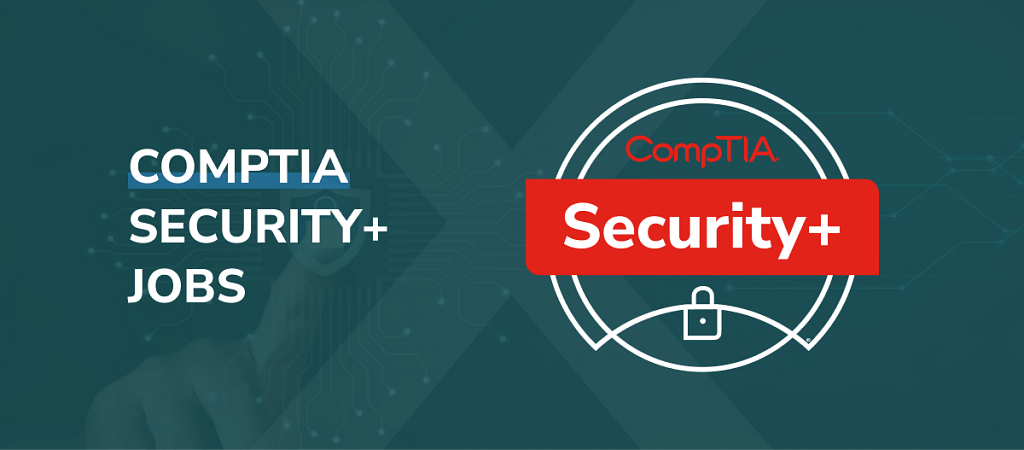
Have you ever wondered what jobs are open if you get Security+ certified? Can anyone substantiate the many claims of rich professional and financial rewards after getting Security+ certified?
Look no further: we’ve put this article together to show you how the Security+ certification can accelerate your transition into a promising cyber security career.
To make such a career leap, proper study, planning, and knowing your next steps after getting a certification are important. Thanks to what you’ll learn here, you’ll know how much CompTIA Security+ jobs are worth the time and effort you’ll have spent studying for this certification.
Without further ado, let’s dive in and explore salaried positions available to Security+ certification holders.
Overview of the CompTIA Security+ Certification

CompTIA is short for “Computing Technology Industry Association.” The CompTIA Security+ certification shows employers that you’ve mastered the fundamental skills to perform core security functions and pursue a relevant career.
Here’s the detailed breakdown of the latest Security+ exam domains:
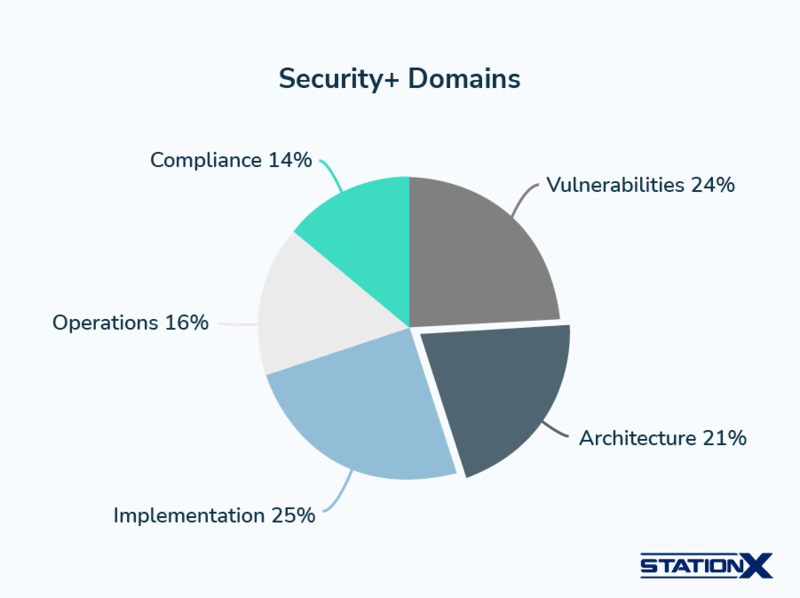
Refer to our Security+ cheat sheet for details.
What Does CompTIA Security+ Certification Prepare You For?
The Security+ certification prepares you for a plethora of jobs in cyber security. This section discusses the six careers mentioned on the official Security+ website that new Security+ certification holders embark upon.
Additionally, CompTIA allows you to view more descriptions of Security+ jobs by selecting from the dropdown menu on this web page.
Business Analyst
Business analysts help organizations identify problems (such as security risks), discuss solutions and implement change. A business analyst conducts interviews, observes meetings, and analyzes data. After gathering information, a business analyst will present their proposed solution.
Cyber Security Manager
Cyber security managers are in charge of the overall cyber safety of an organization. In this advanced-level job role, they manage a staff of cyber security professionals, such as ethical hackers, penetration testers, and members of red and blue teams. They determine a cyber security department’s overall goals and plans, discover problems, and resolve them efficiently.
Software Developer
Software developers innovate methods to complete technical and important tasks throughout their workday. They may develop applications allowing people to do specific tasks on computers or devices or develop the underlying systems that control the devices and networks. Software developers must identify the core functionalities that users need, including security controls.
Systems Administrator
Systems administrators organize, install and support an organization’s computer system and associated software, including local area networks (LANs), wide area networks (WANs), network segments, and other data communication systems.
In contrast, network administrators (another IT role) focus on keeping the organization’s servers and network in operation. They would monitor network traffic using security tools.
MSP Personnel
MSP stands for “managed service provider,” an IT business with the skills, expertise, and experience to implement and manage the technology solutions that help their clients achieve peak business performance. MSP personnel ensure the correct and efficient usage of a vendor’s products and services. They’re also technicians, resolving issues promptly.
Security Consultant
Security consultants protect the confidentiality, integrity, and availability of data and network devices in an organization. They work in-house as part of a security operations center (SOC) or independently as a contractor with multiple clients.
Their role involves proposing infrastructure improvements and overseeing the implementation of these new measures. They must stay up-to-date on the latest cyber security trends and risk factors, and they may train other teams within the organization on security protocols.
CompTIA Security+ Job Opportunities and Salary
Security+ certified individuals have the baseline skills for many of the job types listed above. Prudent cyber security job seekers would do well to remember the various job titles which seek Security+ holders, as a simple search for “Security+” on job-hunting sites other than cybersecurityjobs.com yields irrelevant information, such as security guard job openings.
Salary: Business Analyst
Most business analyst roles are full-time. Some are remote jobs. Few job postings mention Security+ explicitly in the job description. Many of them emphasize SQL skills.
The following are variations of this job title:
- IT Business Analyst
- Business Data Analyst
- Business Intelligence Analyst
- Business Systems Analyst
The job title may or may not specify the job level (entry, junior, senior, etc.). The expected salary range is $50K-100K USD or higher.

Glassdoor “business analyst” search results

Indeed “business analyst” search results
Salary: Cyber Security Manager
Many cyber security manager roles are full-time or remote jobs. Although few job postings mention Security+ explicitly in the job description, some prefer candidates with advanced certifications such as CISSP.
The following are variations of this job title:
- Enterprise/Risk/Information/IT/IT Systems/Network Security Manager
- Cyber Security Program Manager
- Cybersecurity (Vulnerability) Manager (combining “cyber” and “security” as one word)
Most of these roles are senior-level. The expected salary range is $60K-$180K USD or higher.
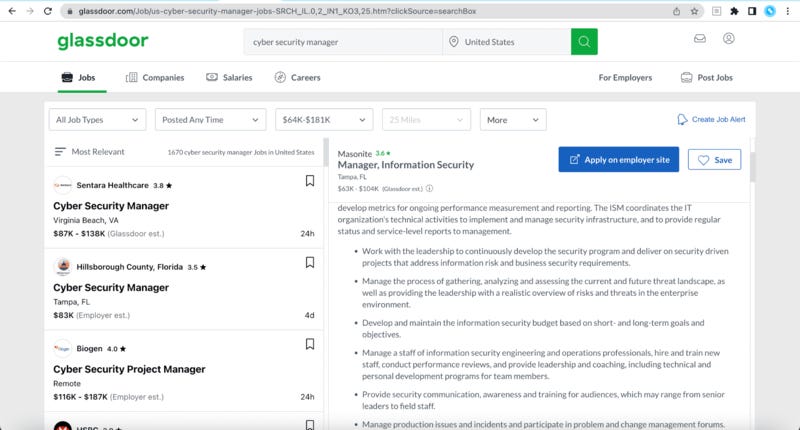
Salary: Software Developer
Software developer roles are mostly full-time or contract-based, and remote jobs abound. Security+ is not a common requirement in software developer job descriptions at present, but given the rising importance of DevSecOps, it’s essential to have security measures built into apps.
Variations of the job title include the following keywords:
- Programmer
- Programmer Analyst
- [Name of programming language, e.g., Python, NodeJS, ReactJS] Developer
- Front End/Front-End/Back End/Backend/Full Stack Software Engineer
The job level is often clear from the job title: many are entry-level or junior positions, but senior positions also exist. The expected salary range is $60K-80K USD or higher.
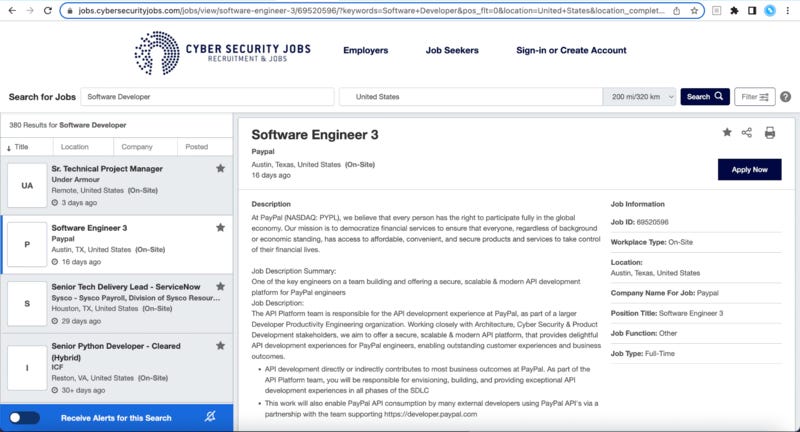
Salary: Systems Administrator
Most systems administrator roles are full-time and remote. It’s common for job postings to mention Security+ in the description.
Most IT positions have diverse job titles, but remarkably, those advertising for this position consistently include “Systems Administrator” in the title. The following are variations of this job title:
- IT/IT Support/IT System Support Specialist
- IT Infrastructure/Cybersecurity Specialist
- Tech Support Specialist
Junior and senior systems administrator roles exist. The expected salary range is $43K-130K USD or higher.
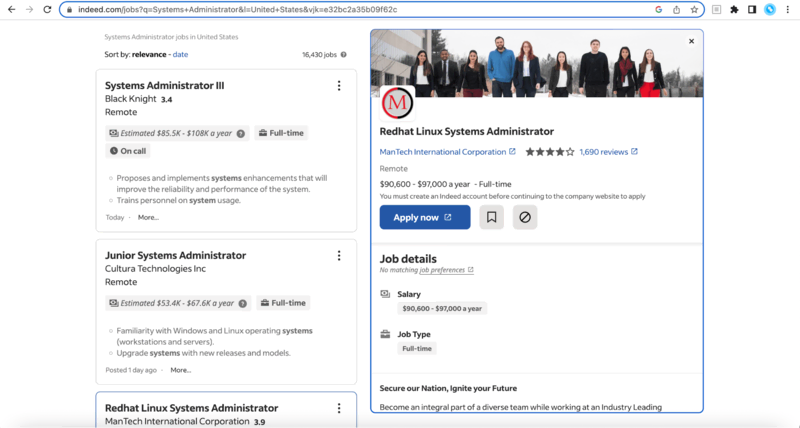

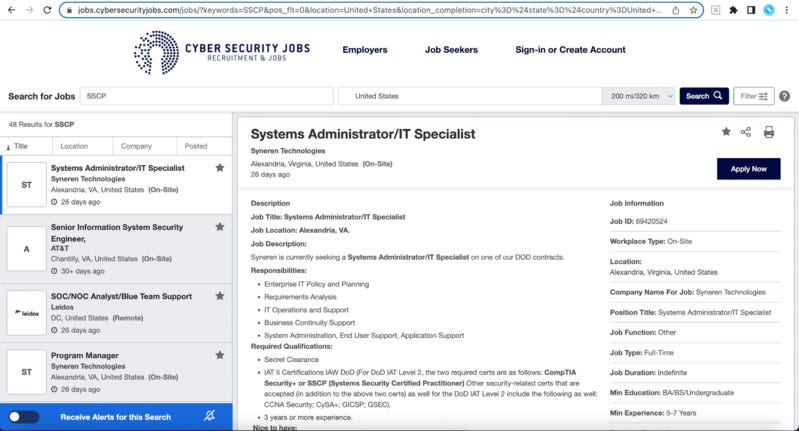
Salary: MSP Personnel
Job searches for this role were tricky as the text string “MSP” returns meaningless results. It’s more effective to spell out “managed service provider” in the query; titular variations of this job nature are too many to count.
Most MSP personnel roles are full-time. Some are remote jobs. Like Systems Administrator positions, many job postings for MSP personnel seek Security+ certified individuals.
The job title may or may not specify that the role is entry-, junior-, mid-, or senior-level. The expected salary range is $33K-100K USD or higher.

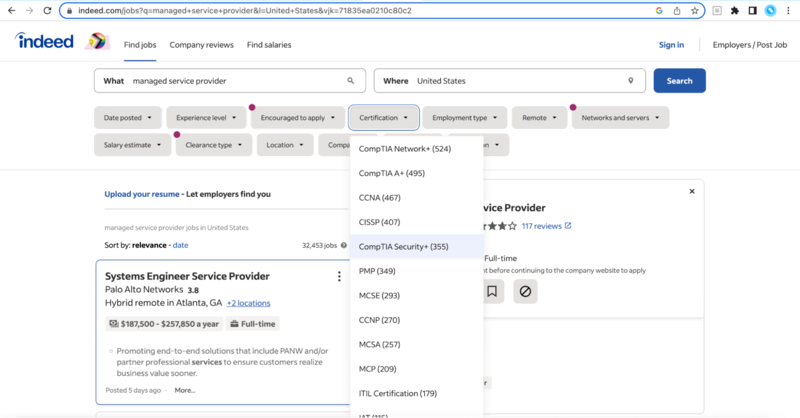
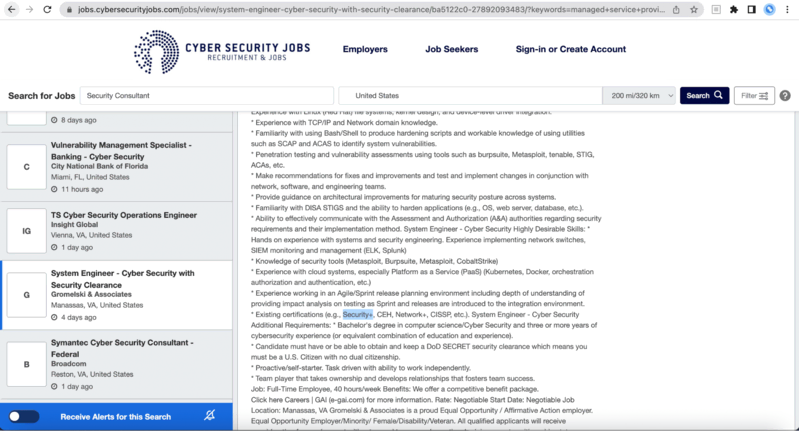
Salary: Security Consultant
Lots of Security Consultant roles are full-time and remote. According to Indeed, Security+ is the second most sought-after certification apart from CISSP. The following are variations of this job title:
- IT/Info/Information Security Consultant
- Information Security Risk Consultant
- Cyber Security Consultant
- Cyber Security Engineer
- IAM Consultant (where “IAM” stands for “Identity, Access, and Management”)
Many of these positions are senior-level. The expected salary is around or upwards of $100K USD.
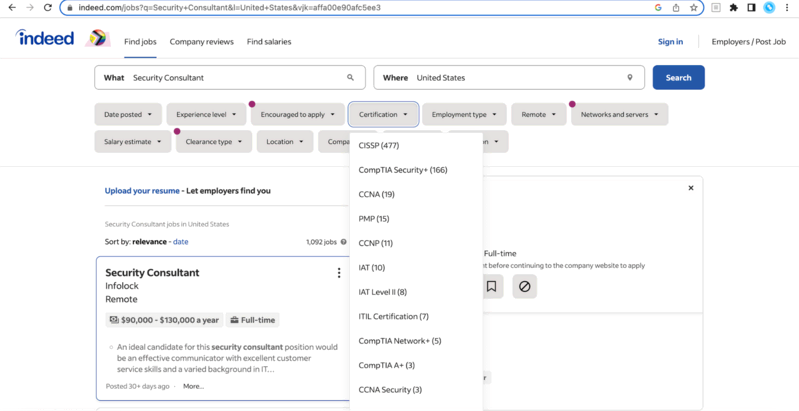
Comparing the Demands for Security+, CCNP Security, and SSCP Holders
You might be wondering whether earning your CompTIA Security+ is worth the effort. How does it measure against other entry-level cyber security certifications, such as CCNP Security and SSCP?
Here are our preliminary search results:
GlassdoorIndeedCyberSecurityJobs.comCompTIA Security+4,002 results

6,132 results

789 results

CCNP Security2,517 results

3,740 results

755 results

SSCP1,557 results

267 results

48 results
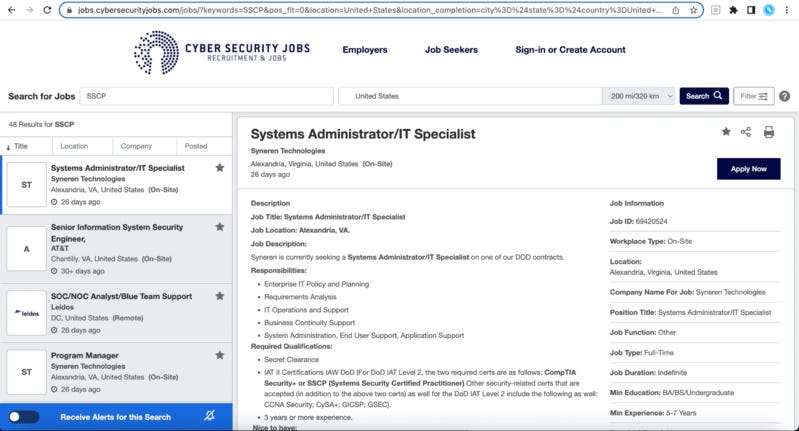
It’s clear from the table above that Security+ emerges as the most recognized certification for breaking into cyber security roles. If you want to make the best use of your time on a cyber security certification with a great return on investment, it’s imperative to consider Security+.
Career Progression
According to our cyber security career pathway, jobs containing “(cyber) security” in the title can be feeder roles to specialized cyber security functions such as offensive (red team) or defensive (blue team) security and security management. Accumulating work experience in cyber security helps you negotiate pay increments or move up the career ladder.
Further cyber security education, such as by gaining additional cyber security and IT certifications beyond Security+, make you more attractive to recruiters looking to fill advanced or specialized cyber security roles such as penetration tester or security engineer.
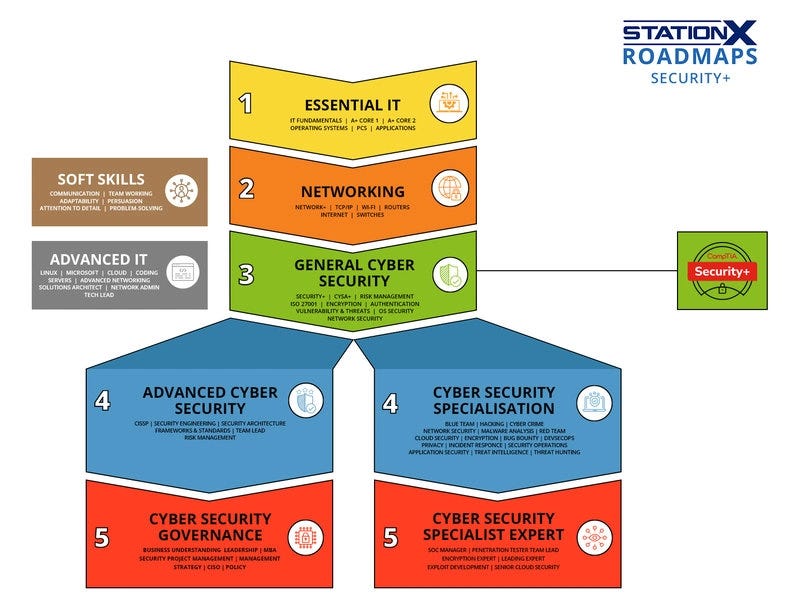
Conclusion
We hope this brief overview of CompTIA Security+ jobs gives you a clear idea of career expectations once you get Security+ certified.
Source StationX
Article posted by: https://certmaster.me/what-comptia-security-jobs-can-you-get-in-2023-2b6ecfb814f?source=rss-d9e5f258a4e8——2
——————————————————————————————————————–
Infocerts, 5B 306 Riverside Greens, Panvel, Raigad 410206 Maharashtra, India
Contact us – https://www.infocerts.com
